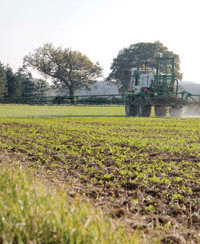DEFRA proposals link environmental schemes with SFP

Single farm payment rules are to be tightened in a bid to force more English farmers to adopt environmental production methods.
Cross-compliance requirements, which must be met by farmers who claim the payment, will be revised to include measures compelling producers to manage as much as 5% of their arable land for environmental purposes.
Growers will still be allowed to farm this land productively, but will be required to implement environmental practices such as field margins, skylark plots, overwintered stubbles and spring cropping.
The measures are further evidence of the government’s determination to replace set-aside with rules restricting output in favour of the environment (see News, 9 January). They will form the cornerstone of a public consultation later this year.
Proposals
Exact proposals are yet to be finalised, as is the amount of land involved. But producers who refuse to abide by the new rules risk falling foul of cross-compliance requirements, which means they risk losing some or all of their single payment.
Despite calls for farmers to produce more food, DEFRA wants more farmers to help it meet environmental targets. Officials from Natural England and the Rural Payments Agency are drawing up a list of options.
Sir Don Curry, who is leading a group of experts looking at the proposals, said biodiversity and the farmland bird index must be taken seriously. “My overriding aim is to increase the uptake of the Entry Level Scheme,” he told Farmers Weekly.
Some 60% of eligible land is farmed under stewardship agreements. Land farmed under ELS options deemed to deliver the right environmental benefits will count towards the new requirements, partially or wholly exempting some farmers.
Compensation
But this will be the only form of compensation, despite the likely impact on farm output. This means farmers who refuse to sign up to ELS and those with the “wrong” ELS options will have to implement environmental practices at their own expense.
Farm leaders remain opposed to the proposals, arguing that they are tantamount to reintroducing set-aside, which was abolished by the recent CAP health check. The NFU said it opposed any measures that introduced unnecessary red tape.
But Sir Don said: “What we are certainly not going to do – and this is important – is include new sections within the SFP application form. We are not going to tinker with the documentation because it would add more bureaucracy and no farmer wants that.”
What it means for farmers in ELS
- Producers signed up to the Entry Level Scheme (ELS) will be least affected by the new measures – but only if they have chosen options deemed to deliver the right kind of environmental benefits. This land will count towards the new requirements. These are likely to be “in-field” options which can deliver big gains for wildlife and biodiversity, rather than the “out-of-field” options often preferred by farmers because they minimise disruption to agricultural operations. Examples include over-wintered stubbles and skylark plots as opposed to options that preserve old archaeological sites or traditional buildings.
What it means for farmers out of ELS
- Farmers who refuse to join ELS will still be expected to introduce environmental measures. But they will not be entitled to any compensation which will only be available in the form of an ELS payment. Producers who refuse to introduce environmental measures risk losing all or some of their Single Farm Payment. The proposals are expected to be finalised this spring. There will then be a public consultation. It is intended that the new requirements will come into force in time for the first ELS renewals in 2010.

